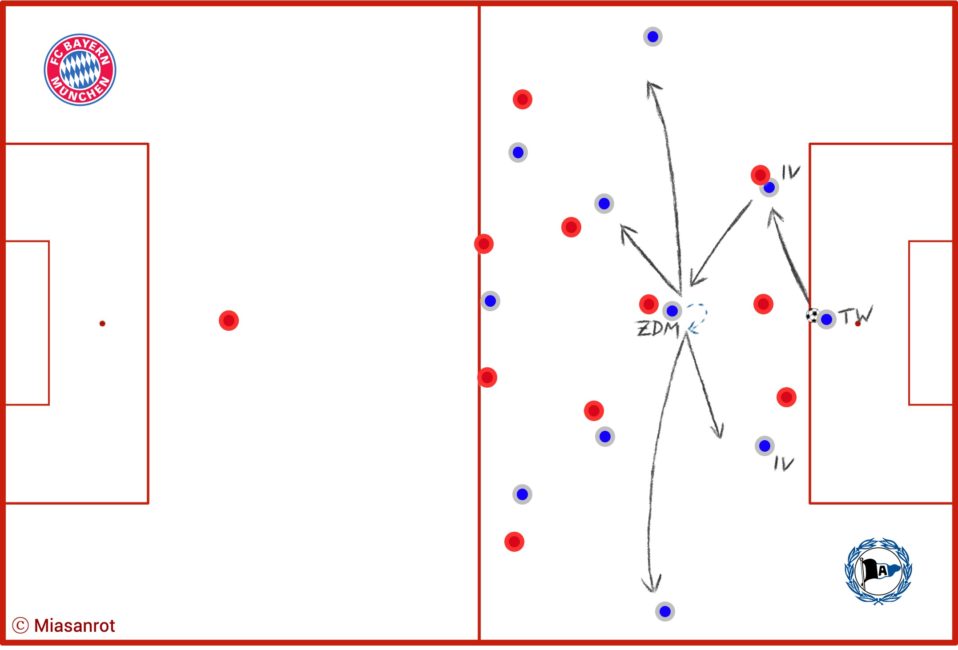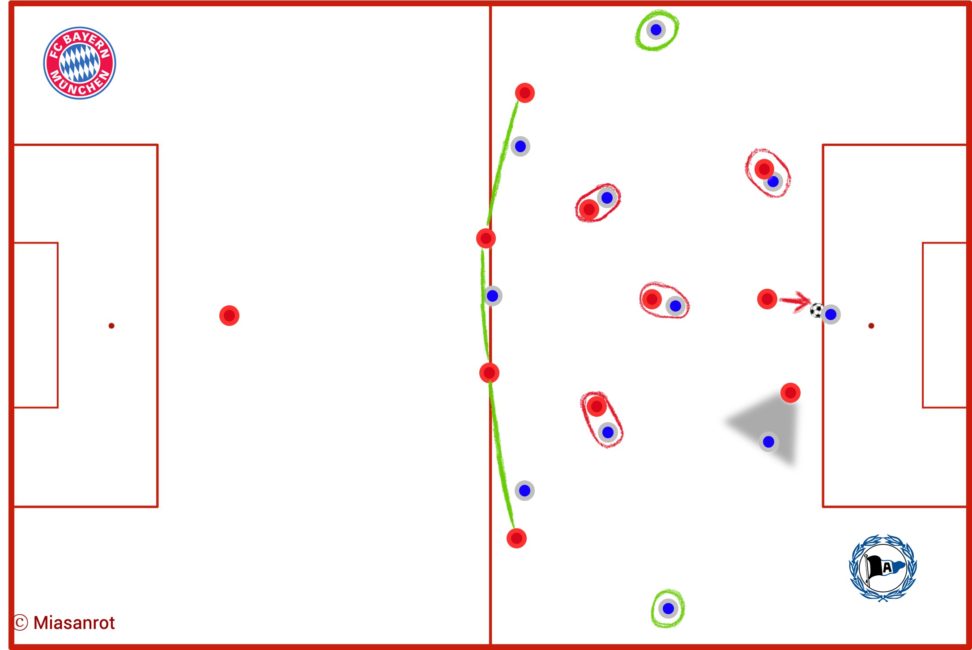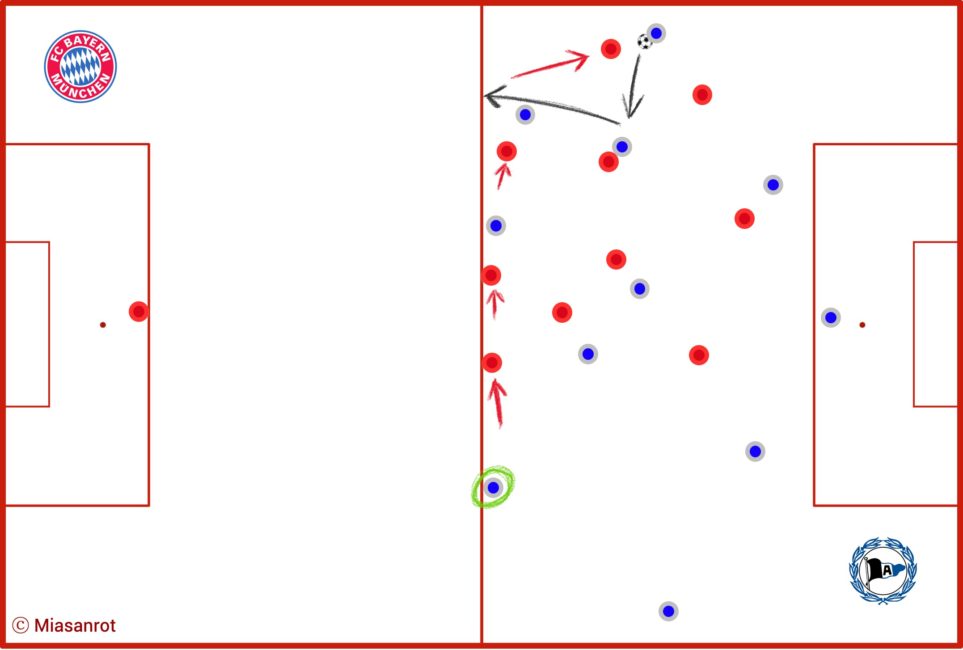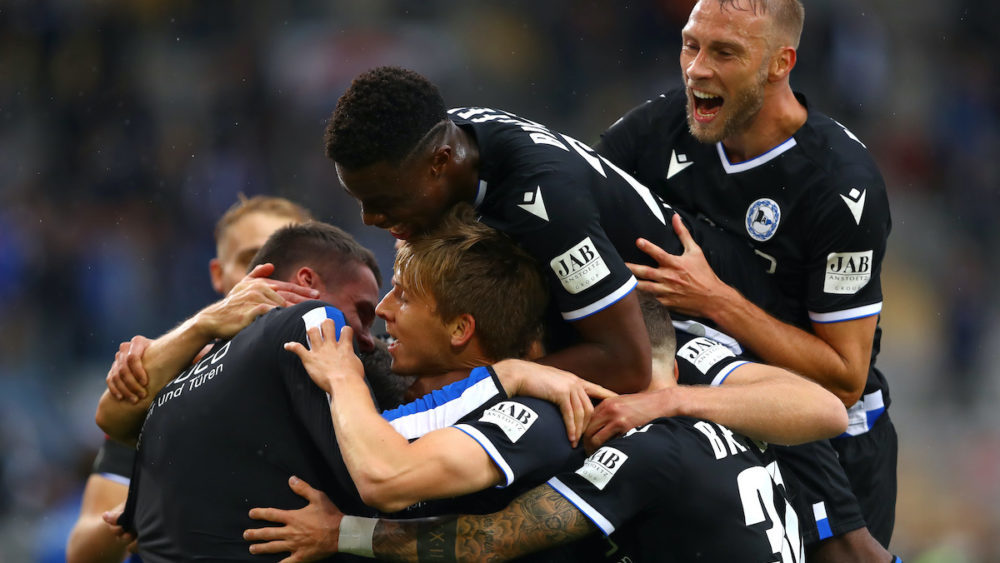Bundesliga MD 04 Preview: Bielefeld vs. Bayern
When Arminia Bielefeld secured their promotion to the Bundesliga in the summer, COVID-19 for a fleeting moment was of no importance. Hundreds of fans let their emotions run free and celebrated their heroes. Not many would have expected Bielefeld to be able to achieve such success before the start of the season.
After Bielefeld seemed to establish themselves in the Bundesliga at the end of the 2000s, difficult years followed. Relegation to the 2. Bundesliga, followed by relegation to the third division as well as financial worries characterized this period. In the 2018/19 season, too, a fierce relegation battle threatened for a long time. But then, on December 10 2018, Uwe Neuhaus took over the coaching job.
Arminia Bielefeld: Suddenly in the Bundesliga
Things quickly improved. The sale of the stadium enabled the club to reduce its debts considerably. Neuhaus had already demonstrated that he was able to lead and establish a club in the second division. He had achieved this with Union Berlin. And not only that: Within a few years, Neuhaus had turned the team from Berlin’s Köpenick neighborhood into a team that became a legitimate challenger for promotion. As a result, ironically, at some point the 7th and 9th places he successively achieved with the club were no longer deemed sufficient and he had to say goodbye.
Neuhaus then became head coach at Dresden, achieved promotion to the second division with that club too, and followed that up by a strong fifth place the season after. But the following season saw Dresden finish in a disappointing 14th place – and Neuhaus was waved goodbye again.
After that followed Bielefeld where so far he seems to have found his destiny. In the second half of the 2018/19 season, he reached 7th place with the club, followed the year after by a clear and, for many, surprising promotion to the Bundesliga. But this achievement can also be seen as the logical conclusion of his personal development. Over the years, Neuhaus has developed his ideas of football further, learned from his mistakes and finally succeeded in leading a club to Bundesliga promotion at the third attempt.
Neuhaus has learned from his mistakes
But what does Neuhaus’s football look like? In the end, pragmatism is probably the word that sums up his approach most succinctly. When he was at Union, as ambitions increased, many became increasingly bored with the tendency of the team tho move the ball around without much territorial gain. Neuhaus’s football was tactically quite advanced and, on its day, it was quite beautiful to watch, but on less good days it provided for a lot of boredom.
Too static, too monotonous pace, not enough risk – the accustomed criticisms of his reappeared at some point in Dresden as well. The final step to the top he simply did not seem to be able to make. But this has changed. His Bielefeld team now seems like the finished product of his years of personal development.
Without a doubt, Neuhaus has been significantly aided by the very clever transfer policy of the club. Last year, talented players like Marcel Hartel, Ritsu Doan or Arne Maier as well as seasoned players like Cebio Soukou or Mike van der Hoorn were brought in for comparatively small amounts of money. And these are just a few examples. However, a healthy mix of small transfer fees, loans and free transfers is only one side of the coin. The other is that these players also fit in seamlessly with Uwe Neuhaus’ ideas of football.
Bielefeld’s build-up play up close
Key to Bielefeld’s success is the team’s backbone consisting of the goalkeeper, central defender and striker. This axis must be brought under control if you want to be successful against Bielefeld.
What the holding midfielder or center-back is to many other clubs, goalkeeper Stefan Ortega is to Bielefeld: the pacemaker and the cornerstone of his team’s build-up play. The 27-year-old often makes the difference when it comes to playing around the opposing press.
In build-up play, the central defenders shift out wide to the left and right. But instead of having the holding midfielder drop off into the space so created, Ortega usually pushes up a bit. He, the two center-backs and the defensive pivot now form a diamond, which allows Bielefeld to lure the opponent to close in and then overplay the center of midfield. Against Bayern, this could look like something this:

Relying on Ortega’s skills on the ball is probably a tactic worth pursuing against the Bayern team, despite the risk of losing the ball because it will face Flick’s team with unusual questions.

For example, the chart above displays a typical course of action of Bayern in pressing when the opposing goalkeeper is in possession of the ball: The wingers get tight to the two center-backs while the center-forward closes down the player on the ball. The midfielders man-mark their opposing counterparts, while in defense, the players spread out in a zonal marking pattern. If Bayern were to use this tactic against Bielefeld, too, it may succeed in depriving Bielfeld of their precision in their otherwise well organized build-up game. But it could also play into the opponent’s hands:

For Bayern the devil is in the details
Man marking has the disadvantage that players always have to be in the right place at the right time, whereas maintaining close distances to their opponents is the primary challenge in zonal marking. If Bayern’s game works as it did over large parts of the last Rückrunde, teams like Bielfeld do not stand a chance, if only because of their individual inferiority. This season, however, Bayern still lack coordination and precision.
So if Bielefeld manage to play the ball through the first line of Bayern’s press into the middle of the park and from there out to the full-backs, who Bayern’s press often deliberately gives some space, there is a danger of a quick pass in behind if Bayern do not manage to close down the spaces fast and efficient enough.
Counter-attacks like the one shown above are a quite normal occurrence in a Bayern game. Last season there were a number of such situations. But the great quality of Bayern last season was to decelerate the opponent’s counter-attack sufficiently to deprive it of any threat, even when their press was overplayed, or to regain the ball quickly through their remaining defenders. Bayern are willing to accept a degree of openness at the back as a calculated a risk that is balanced by tactically clever movements and speed as well as duel strength of the defenders and justified by the additional penetration they get in attack in exchange.
Sitting deeper is not really a viable alternative per se
But if Bayern miss decisiveness in pressing or if players like Pavard, Alaba or Davies suddenly make mistakes, the game might take a similar turn as some of the most recent ones where the team is actually superior and has more possession, but is vulnerable at the back.
Flick has a point when he cites the lack of preparation as the reason for this. To enable the players to make high quality decisions on the field consistently, it takes time, rhythm and regular training. Nothing of this has exactly been abundantly available recently and so it is difficult for Bayern to put pressure on the opponent efficiently at the moment.
However, a much deeper positioning against the ball would not necessarily solve the problem. Ultimately, this would be a change that would require even more discipline and, above all, new movements and automatisms which the team has not practiced yet. This in turn could lead to even more mistakes and be even more physically taxing, because the team has fewer and shorter spells in possession and therefore has to chase the ball more.
Bielefeld will make it difficult for Bayern
Accordingly, Flick will be looking for adjustments in detail. Maybe he will order his players to position themselves slightly deeper and not use every opportunity they get to put pressure on the opponent, but wait until the ball is played into midfield before they attack them. At least this is a tactic that Flick used against Borussia Dortmund in the Supercup at times. It would also allow the wingers to better support the full-backs.
Bielefeld will be a real test for Bayern. Although individually they are one of the weakest teams in the league, they are well organized as a collective. Neuhaus has turned them into a solid team that is strong against the ball and capable of structured and organized build-up play from the back.
Above all, Bielefeld is versatile enough to be able to build up not only in the aforementioned way. It would suit Bayern very well if Bielefeld wanted to resolve every situation in a playful manner. But being a team with a long-standing history in the second division, they also have much more mundane skills in their repertoire. In addition to acting with surgical precision, Bielefeld also know how to play long balls over the top to the target man up front: Fabian Klos. With his physicality, the 32-year-old center forward is the perfect wall player for the Neuhaus side.
Is Bielefeld capable of a surprise?
Klos possesses great hold-up play. He is strong at receiving the ball, screening it, and distributing it. Also, he has a clinical finish in the penalty area. To be considered a top striker in the Bundesliga he lacks technique and speed, but for Bielefeld he is worth his weight in gold because he can draw and hold the attention of several opponents at once. This might prove a real asset against Bayern’s zonal defending since it might very well open up spaces for Bielefeld’s fast wingers.
Bielefeld do not concede to many chances at the back, play well going forward, but usually have problems to carry through their attacking plays to a successful conclusion. One might think that this is the classic Neuhaus dilemma: Too pragmatic to take a risk going forward. If Bielfeld manage to develop more assertiveness in attack over the course of the season, they will certainly be able to surprise everyone and retain their Bundesliga status.
The game against Bayern cannot be more than a free hit on this journey. But if they should get something from this game, it would not be the first time that they succeed in doing something that hardly anyone would have expected them to do.





